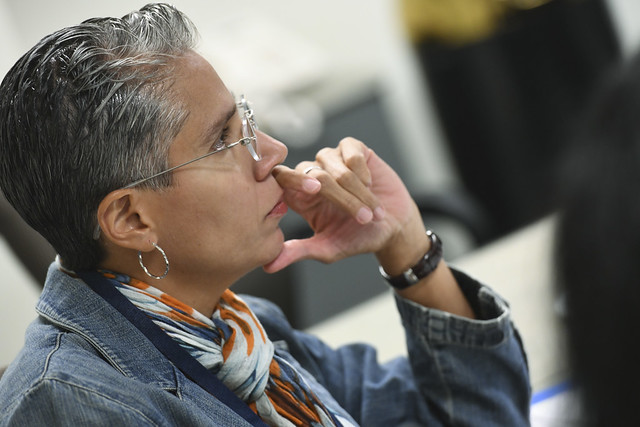While the first instinct in a catastrophe may be to run for safety, MaryJo Ginese learned in hands-on training that she could instead head for cover, check out the area of damage, and then possibly return and drag a person to safety.
“Maybe I could save somebody,” said Ginese, a member of NYSUT’s Health Care Professionals Council and vice president of special education at the United Federation of Teachers. She was recently trained at the UFT in Stop the Bleed, a national movement to educate laypersons in helping out at mass casualties.
Depending on where the bleeding is coming from, you respond differently, Ginese informed her colleagues at the health care council during a meeting last week. Stuffing the wound or applying a tourniquet – using a band, a belt, or a shirt — are options she was trained in.
“So many people die while waiting for trained personnel to show up at a mass casualty,” said Nancy Barth-Miller, a UFT nurse and member of the council. “You can serve as a lifesaver while stopping someone from bleeding.”
In response to ongoing concerns about shootings, or other traumatic injuries, NYSUT is investigating offering the how-to workshop at its spring health care conference.
Stop the Bleed is a national awareness campaign and call-to-action. It is set up to encourage bystanders to become trained and equipped to help in an emergency. Visit bleedingcontrol.org to find a list of available classes.
Photo Gallery

The NYSUT council will also be advocating the Legislature to pass bills for more full-time school counselors, social workers and psychologists.
“The biggest gap is in elementary schools,” said Rosemarie Thompson, school counselor and HCPC member
“It really requires an advocacy,” said June Feder, school psychologist and council member. “As a union we’ve been in the forefront of including mental health needs, including the emotional and psychological needs of children.” She termed the bills “long overdue.”
“It’s amazing to me how little knowledge there is …about mental health,” said Anne Goldman, nurse, chair of the Health Care Professionals Council and a UFT vice president.
The council will also have testimony submitted for the Department of Health hearings on safe staffing, one of which will be held Oct. 22 in New York City. NYSUT has been advocating for a safe staffing ratio bill to be passed to better ensure the safety of both nurses and patients.